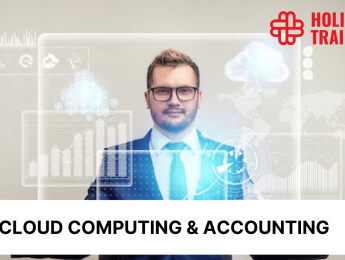In the rapidly evolving digital age, businesses are continuously seeking innovative ways to streamline their processes and enhance productivity. Cloud computing, a paradigm that provides access to computing resources and services over the internet, has emerged as a game-changer across various industries. In the realm of accounting, cloud computing is transforming the way financial data is managed, stored, and accessed. In this blog post, we will delve into the world of cloud computing and explore its impact on accounting information systems. Moreover, we will outline five key benefits of adopting cloud computing in accounting while acknowledging the potential risks associated with this technology.
Understanding Cloud Computing
Before delving into the transformative impact of cloud computing on accounting information systems, it's crucial to grasp the fundamental concepts that define this revolutionary technology.
The Essence of Cloud Computing
At its core, cloud computing represents a paradigm shift in the way computing resources are delivered and consumed. Instead of relying on local servers and physical infrastructure, cloud computing leverages the power of the internet to provide on-demand access to a wide array of computing services. These services encompass servers, storage, databases, networking, software, and analytics.
Models of Cloud Computing
Cloud computing operates through three primary models, each offering distinct advantages and use cases:
1. Software as a Service (SaaS)
SaaS involves the delivery of applications over the internet, eliminating the need for local installations. Users can access these applications through web browsers, freeing them from the constraints of specific devices or locations. This model enhances accessibility and reduces the burden of software maintenance on end-users.
2. Platform as a Service (PaaS)
PaaS provides a comprehensive platform that allows users to develop, run, and manage applications without getting entangled in the complexities of infrastructure management. Developers can focus on coding and application functionality, leaving the underlying infrastructure, such as servers and databases, to the cloud service provider. This streamlines the development process and accelerates time-to-market for applications.
3. Infrastructure as a Service (IaaS)
IaaS offers virtualized computing resources, including virtual machines and storage, as a service. This model provides businesses with the flexibility to scale their computing infrastructure based on demand without the need for physical hardware. IaaS is particularly valuable for businesses with varying computing needs, allowing them to adapt quickly to changes in workload and demand.
Characteristics of Cloud Computing
Several key characteristics distinguish cloud computing from traditional computing models:
a) On-Demand Self-Service
Users can provision and manage computing resources as needed, without requiring human intervention from the service provider.
b) Broad Network Access
Cloud services are accessible over the internet from a variety of devices, promoting ubiquitous access for users with an internet connection.
c) Resource Pooling
Cloud providers pool computing resources to serve multiple customers, ensuring efficient resource utilisation and cost-effectiveness.
d) Rapid Elasticity
Cloud resources can be rapidly scaled up or down to accommodate changing workloads, providing flexibility and cost savings.
e) Measured Service
Cloud computing resources are metered, allowing businesses to pay for the resources they consume, promoting cost transparency and efficiency.
The Evolution of Cloud Computing in Accounting
The traditional accounting model involved on-premises management of financial data and applications. This approach, while prevalent for years, presented challenges such as limited accessibility, potential data loss, and high infrastructure costs. Cloud computing has emerged as a transformative solution, addressing these challenges and providing a more agile, cost-effective, and scalable alternative for managing accounting information systems.
In the next sections, we will explore how cloud computing is reshaping accounting by examining its benefits, potential risks, and the ways it facilitates enhanced collaboration, productivity, and data management within financial domains.
How Is Cloud Computing Changing Accounting?
The traditional accounting model involved handling financial data and applications on-premises. However, this approach posed several challenges, such as limited accessibility, potential data loss, and high infrastructure costs. Cloud computing, on the other hand, revolutionises accounting by offering various benefits that overcome these challenges.
Flexibility and Accessibility
One of the most profound impacts of cloud computing on accounting lies in the newfound flexibility and accessibility it provides. In traditional accounting models, financial data and applications were confined to on-premises servers, limiting accessibility and collaboration. Cloud-based accounting systems transcend these constraints, allowing financial information to be accessed from any location with an internet connection.
This level of accessibility is particularly advantageous for businesses with multiple locations or remote employees. Accountants and authorised personnel can seamlessly collaborate, update information in real-time, and make critical financial decisions without being tethered to a specific physical location. The result is a more agile and responsive accounting process that adapts to the dynamic needs of modern businesses.
Cost-Efficiency
Cloud computing offers a revolutionary shift in the cost structure of accounting operations. Traditionally, businesses had to make substantial upfront investments in physical infrastructure, including servers and data centres, to manage their accounting systems. Cloud-based accounting services, however, operate on a pay-as-you-go model.
This means businesses subscribe to the services they need, paying only for the resources utilised. The elimination of heavy upfront investments reduces financial barriers, making advanced accounting capabilities accessible to businesses of all sizes. Furthermore, cloud solutions often include automatic software updates, reducing the need for dedicated IT personnel and further lowering operational costs.
Scalability
Cloud-based accounting systems provide unparalleled scalability—a critical feature for businesses experiencing fluctuating workloads. During periods of high activity or expansion, businesses can easily scale up their computing resources to meet increased demand. Conversely, during quieter periods, they can scale down to avoid unnecessary costs.
This flexibility ensures that the accounting system grows organically alongside the business, preventing the disruptions and inefficiencies associated with rigid, on-premises infrastructure. Scalability is particularly beneficial for businesses with seasonal variations or those undergoing rapid growth, allowing them to adapt to changing needs seamlessly.
Data Security and Reliability
Security and reliability are paramount considerations in accounting, given the sensitivity of financial data. Reputable cloud service providers invest heavily in ensuring the robustness of their platforms. They employ advanced encryption techniques to safeguard data during transmission and storage.
Regular data backups and robust disaster recovery plans further contribute to the reliability of cloud-based accounting systems. These measures often surpass the security levels that many small and medium-sized businesses can afford to implement on-premises. As a result, businesses leveraging cloud computing can have confidence in the integrity and availability of their financial data.
Integration and Automation
Cloud accounting systems go beyond mere storage and processing of financial data; they seamlessly integrate with a myriad of software and applications. This integration capability streamlines the overall accounting process by eliminating silos of information and automating routine tasks.
By automating repetitive tasks such as data entry, reconciliation, and invoicing, cloud-based solutions empower accountants to focus on more strategic and analytical aspects of their work. This shift from manual, time-consuming processes to automated workflows enhances efficiency, reduces errors, and allows accounting professionals to add greater value to the financial management of the business.
5 Key Benefits of Cloud Computing in Accounting
According to Statista, a survey conducted in 2020 showed nearly half of the respondents, or 48 percent, identified increased efficiency as the most significant advantage gained from cloud computing. That said, let's explore five key benefits that highlight how this revolutionary technology can transform your accounting information system:
1- Enhanced Collaboration and Productivity
Cloud-based accounting systems foster collaboration among accountants, financial managers, and other stakeholders. Multiple users can work on the same data simultaneously, reducing delays and enhancing productivity. This real-time collaboration ensures that the most up-to-date information is readily available to all relevant parties.
Moreover, cloud solutions often offer built-in communication tools, making it easier for team members to discuss financial matters, share insights, and collectively make informed decisions. This level of collaboration can lead to more effective financial management and improved business outcomes.
2- Improved Data Accuracy and Timeliness
Traditional accounting systems could be prone to errors, especially when dealing with manual data entry and complex spreadsheets. Cloud-based accounting systems offer automation features that significantly reduce the risk of errors, ensuring data accuracy.
Additionally, cloud solutions facilitate automatic data synchronisation and real-time updates, eliminating the need for time-consuming data transfers or manual data consolidation. This, in turn, ensures that financial reports and insights are timely and accurate, supporting better decision-making.
3- Mobility and Accessibility
Cloud accounting liberates businesses from the constraints of physical location. Financial data and applications can be accessed securely from any device with an internet connection. Whether accountants are travelling, working from home, or attending client meetings, they can conveniently access essential financial information, perform necessary tasks, and respond to urgent queries in real-time.
The mobility and accessibility offered by cloud computing provide businesses with the agility to respond swiftly to changing market dynamics and stay competitive in today's fast-paced business environment.
4- Advanced Reporting and Analytics
Cloud-based accounting systems often come equipped with sophisticated reporting and analytics capabilities. These tools enable accountants to generate insightful financial reports, perform data analysis, and gain valuable business insights. Businesses can leverage these analytical tools to identify trends, forecast financial performance, and make data-driven decisions.
Moreover, the integration of artificial intelligence and machine learning in cloud accounting solutions empowers businesses to automate complex financial analyses, allowing accountants to focus on strategic planning and value-added tasks.
5- Seamless Regulatory Compliance
Staying compliant with ever-evolving accounting standards and tax regulations can be a daunting task for businesses. Cloud-based accounting systems often come with compliance features that ensure businesses adhere to the latest regulatory requirements.
For instance, these systems may include automated tax calculations and updated tax rates, reducing the risk of errors and penalties. Additionally, cloud-based solutions offer detailed audit trails, making it easier for businesses to track and document financial transactions, which can be invaluable during audits.
Table 1: Metrics to measure the effectiveness of a cloud-based accounting software
Metric | Description | Importance |
Uptime Percentage | Ensures consistent availability of the system. | High reliability is paramount. |
Data Encryption Standards | Determines the robustness of data protection. | Crucial for safeguarding data. |
Scalability and Performance | Measures adaptability and speed in operations. | Essential for business growth. |
Integration Capabilities | Evaluates seamless interaction with other tools. | Facilitates streamlined workflows. |
User Accessibility | Gauges ease of access from various devices. | Critical for flexible work environments. |
Risks of Cloud Accounting
While the benefits of cloud computing in accounting are substantial, it is crucial for businesses to be aware of potential risks associated with adopting cloud-based solutions. Understanding these risks is essential for making informed decisions and implementing strategies to mitigate potential challenges.
1. Data Security and Privacy Concerns
Storing sensitive financial data on remote servers raises legitimate concerns about data security and privacy. Businesses must carefully select reputable and secure cloud service providers that employ robust encryption and comprehensive data protection measures. Regular audits of the provider's security protocols and compliance certifications should be part of the due diligence process.
2. Downtime and Reliability
The reliance on an internet connection for accessing cloud accounting systems introduces the risk of downtime. Any network outages or service disruptions can impact the ability to access financial data, potentially leading to operational disruptions. While reputable cloud providers strive to maintain high uptime levels, businesses should have contingency plans in place to mitigate the impact of occasional downtime, ensuring continuity of critical accounting processes.
3. Vendor Lock-in
Migrating from one cloud provider to another can be complex and costly. Businesses may encounter challenges associated with vendor lock-in, where dependencies on a specific cloud provider's infrastructure and services make transitioning to an alternative provider difficult. To mitigate this risk, businesses should carefully assess the contractual terms, understand data portability options, and explore exit strategies before committing to a particular cloud service provider.
4. Regulatory Compliance
Staying compliant with ever-evolving accounting standards and tax regulations is a critical aspect of financial management. Cloud-based accounting systems must align with industry-specific regulations, especially when dealing with sensitive financial data and personally identifiable information (PII). Businesses need assurance that their chosen cloud provider adheres to relevant regulatory requirements and provides features such as automated tax calculations and updated tax rates to minimise the risk of non-compliance.
5. Data Ownership and Control
The issue of data ownership and control is central to cloud accounting. Businesses should seek clarity on their rights concerning financial data stored in the cloud. Understanding who has access to the data, how it is managed, and what happens in the event of contract termination is crucial. Clear contractual agreements outlining data ownership rights and exit strategies can mitigate the risk of losing control over critical financial information.
6. Limited Customisation Options
While cloud accounting solutions offer a broad range of features, they may not always cater to the specific needs and workflows of every business. Some businesses with unique or highly specialised accounting requirements may find themselves limited by the standardised nature of cloud-based solutions. This lack of customization options could hinder optimal utilisation of the accounting system, necessitating workarounds or compromises in functionality.
7. Dependence on Internet Connectivity
The seamless operation of cloud-based accounting systems is contingent on reliable internet connectivity. In regions or situations where internet access is intermittent or slow, users may experience delays or difficulties in accessing financial data. Businesses operating in such environments need to assess the reliability of their internet infrastructure and consider backup measures to ensure uninterrupted access to critical accounting information.
8. Potential for Service Discontinuation
The landscape of technology is dynamic, and cloud service providers may discontinue specific services or products. This could pose challenges for businesses heavily reliant on those services, leading to disruptions in their accounting processes. Regular communication with the cloud service provider and staying informed about their long-term plans can help businesses anticipate and prepare for potential service discontinuations.
9. Limited Local Data Control
In some cases, businesses operating in regions with stringent data sovereignty regulations may face challenges related to limited control over the physical location of their data. Cloud providers may store data in data centres across different geographic locations, potentially conflicting with local regulations. This lack of local data control can result in compliance issues and legal challenges for businesses.
In summary, while the benefits of cloud accounting are substantial, businesses must proactively address these risks. This involves thorough vetting of potential cloud service providers, implementing robust security measures, and developing contingency plans to ensure the resilience of accounting processes in the face of unforeseen challenges. Striking a balance between harnessing the advantages of cloud computing and addressing potential risks is crucial for building a resilient and secure accounting information system.
Conclusion
Cloud computing has transformed the landscape of accounting information systems, offering businesses a range of benefits that significantly enhance efficiency, productivity, and data management. The flexibility, accessibility, and scalability of cloud-based accounting solutions have proven to be instrumental in driving smarter financial decisions and optimising business performance.
However, businesses must be mindful of potential risks and carefully assess their cloud service provider's security measures, compliance protocols, and data ownership policies. Striking a balance between harnessing the power of cloud computing and ensuring robust security and compliance measures will undoubtedly pave the way for a future where accounting is not just efficient but also resilient in the face of evolving challenges.
In navigating the transformative journey of cloud computing, businesses can ensure they stay ahead by enrolling in our comprehensive course, ‘Cloud Management & Security.’ Gain the expertise needed to harness the full power of cloud computing for accounting while mastering the strategies to mitigate risks, ensuring a seamless and secure transition. Elevate your skills and lead the way towards a future where efficient and resilient accounting practices define success. Enrol today and embrace the future of cloud-driven financial management!






















